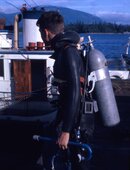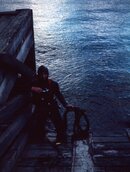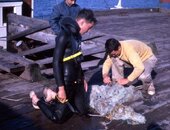I have now read through all these posts, and have a couple of points to make.
--Divers today are much different people than the divers of the 1950s and 1960s.
Let me explain; when I began scuba diving in 1959, at age 14, I had been in the water since the age of six. I had gone through swimming lessons at the YMCA in Salem, Oregon, then entered swim team. I had swam age group swimming since age 8, and used to watch Sea Hunt after swim team practice before going home for supper. I had been snorkeling since age 10 or so, and had done open water snorkeling in rivers and reservoirs before owning a wet suit (that got really cold in some of the streams, such as the creek at Silver Creek Falls summer camp). I had also taken either YMCA or Red Cross Lifesaving courses (plural) before getting my scuba unit. In other words, those of us who endeavored to scuba dive were highly motivated swimmers who were very, very comfortable in the water. I received my first formal course in scuba diving in 1963, from LA County instructor Roy France, who was brought into the area by our dive club, the Salem Junior Aqua Club. I read everything I could find on scuba diving, including Cousteau's The Silent World (three times, I think). If you read that book three times, you will have the basic knowledge to dive; not the water skills, but the basic knowledge. Frederick Dumas made sure of that (from Dr. Sam Miller, Dumas was the actual author of The Silent World, and that is acknowledged in the front of the book). For lifesaving, we had to tread water for 5 minutes with our hands out of the water, and float motionless in the water for 15 minutes (that simply got boring). We also had to rescue a fighting "victim" (usually the biggest guy they could find).
--We dove with the club.
Dive clubs at the time were how we dove. We drove to the dive sites together, and were associated with the Salem Aqua Club, the senior members who watched over us.
--We were skin divers first.
Most of us did breath-hold skin diving before getting into scuba, and along with scuba diving. At the time I could breath-hold dive to 60 fsw.
In short, we were very comfortable in the water, with or without scuba, as we had virtually grown up in the water. The photos below are of a Salem Aqua Club and Salem Junior Aqua Club combined trip to Thetis Island, BC, Canada in about 1963-4 era (cannot remember the date). Lots of good memories, including that net we cut off a boat's prop and wrestled to the surface after it dropped us to the bottom at about 30 feet (note--no BCs to use to lift, just good swim fins and a lot of effort).
--We dove shallow
Our dives were between about 30 feet and 60 feet (about 10-20 meters), mainly to either spear fish or for "discovering" the underwater world. We were not interested in deep diving, as it is really cold in Oregon, and we knew of the deaths of divers such as Maurice Fargues and Hope Root from diving deep. It wasn't an ego thing...it was exploration.
SeaRat
--Divers today are much different people than the divers of the 1950s and 1960s.
Let me explain; when I began scuba diving in 1959, at age 14, I had been in the water since the age of six. I had gone through swimming lessons at the YMCA in Salem, Oregon, then entered swim team. I had swam age group swimming since age 8, and used to watch Sea Hunt after swim team practice before going home for supper. I had been snorkeling since age 10 or so, and had done open water snorkeling in rivers and reservoirs before owning a wet suit (that got really cold in some of the streams, such as the creek at Silver Creek Falls summer camp). I had also taken either YMCA or Red Cross Lifesaving courses (plural) before getting my scuba unit. In other words, those of us who endeavored to scuba dive were highly motivated swimmers who were very, very comfortable in the water. I received my first formal course in scuba diving in 1963, from LA County instructor Roy France, who was brought into the area by our dive club, the Salem Junior Aqua Club. I read everything I could find on scuba diving, including Cousteau's The Silent World (three times, I think). If you read that book three times, you will have the basic knowledge to dive; not the water skills, but the basic knowledge. Frederick Dumas made sure of that (from Dr. Sam Miller, Dumas was the actual author of The Silent World, and that is acknowledged in the front of the book). For lifesaving, we had to tread water for 5 minutes with our hands out of the water, and float motionless in the water for 15 minutes (that simply got boring). We also had to rescue a fighting "victim" (usually the biggest guy they could find).
--We dove with the club.
Dive clubs at the time were how we dove. We drove to the dive sites together, and were associated with the Salem Aqua Club, the senior members who watched over us.
--We were skin divers first.
Most of us did breath-hold skin diving before getting into scuba, and along with scuba diving. At the time I could breath-hold dive to 60 fsw.
In short, we were very comfortable in the water, with or without scuba, as we had virtually grown up in the water. The photos below are of a Salem Aqua Club and Salem Junior Aqua Club combined trip to Thetis Island, BC, Canada in about 1963-4 era (cannot remember the date). Lots of good memories, including that net we cut off a boat's prop and wrestled to the surface after it dropped us to the bottom at about 30 feet (note--no BCs to use to lift, just good swim fins and a lot of effort).
--We dove shallow
Our dives were between about 30 feet and 60 feet (about 10-20 meters), mainly to either spear fish or for "discovering" the underwater world. We were not interested in deep diving, as it is really cold in Oregon, and we knew of the deaths of divers such as Maurice Fargues and Hope Root from diving deep. It wasn't an ego thing...it was exploration.
SeaRat
Attachments
Last edited:






